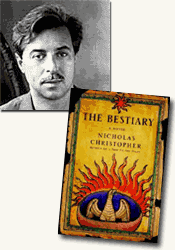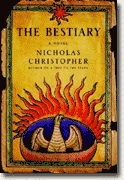author interview
book reviews:
· general fiction
· chick lit/romance
· sci-fi/fantasy
· graphic novels
· nonfiction
· audio books
· author interviews
· children's books @
curledupkids.com
· DVD reviews @
curledupdvd.com
newsletter
win books
buy online
links
home
for authors
& publishiss
for reviewers

|
|||||
 
Midge Bork interviewed Nicholas Christopher, author of The Bestiary Interviewer Midge Bork: 1. How does your background as a poet influence your writing as a novelist? Nicholas Christopher: I was a poet first, and I was publishing my poems in magazines and journals while still in college. When I began writing fiction in my mid-twenties, I thought at first that I must keep the two disciplines separate. I wanted to write fiction that was borne along by strong narratives and fully rounded characters. I did not want to write a beautifully wrought, but narratively aimless, novel — pejoratively called “a poet’s novel.” But I soon realized that the precision and imagistic facility necessary to produce a vivid poem are among the tools required when one is constructing an extended narrative line and delineating character. My training as a poet, and the fact I write and publish poetry as steadily as I ever did, have helped me to strive always for precision and economy in my novels, no matter how dense or complex the subject matter. You are a very descriptive writer. Why the use of so much color in your descriptions? When I am writing, I concentrate on bringing to life my scenes with the strongest, and hopefully freshest, possible details. The colors of objects, clothing, places, etc. are all integral, in my mind, to presenting them three-dimensionally to the reader. Writing without colors, for me, would be like painting without different pigments. Is the actual theme of the book Xeno's quest to become at peace with his feeling of abandonment? Did he forgive his father once he realized his inheritence, the ship Makara, could be used as an ark (of sorts) to help Lena save the big cats? Or did he just replace his old feelings with his love for Lena? Is it that you don't have to forgive, just accept the way things are? I believe it is the latter. I don't think he ever forgives his father for denying his existence (literally), to advance himself in the world. But he certainly accepts his father's flaws, for the simple reason none of us have any choice but to do so with the people in our lives. What he can choose to do is make a break with his father, as he does, when things get too painful for him. The ship, a primal symbol of journeying, is his father's great gift to him. The fact Xeno can use the Makara to aid the person he loves most, in a cause he believes in, helps him to heal some of his wounds. But, again, healing and forgiveness are two different things. His father pointedly leaves one remembrance for Xeno in his cabin on the ship: a photograph of himself with Xeno's mother, the only one Xeno has ever seen; Xeno sees how happy his parents were, but he realizes, too, that his father is telling him that it was Xeno's mother he truly -- and only -- loved. Other fathers might have expressed their love for their sons.
It was. His many good qualities were weighed down by the extreme vanity arising from the volatile combination of his genius and scientific achievement and his dire condition as a severely disabled person, just barely tethered to life. Bruno accrues a great deal of fame and power, yet his body fails him (in his own mind) when it comes to enjoying the fruits of that power. His resentments, and his bitterness at the way mankind has treated animals, combine to poison much of his personality, though he continues to help the truly powerless -- the animals -- throughout his life. Why wasn't Xeno angered by Evgenia's refusal to stay on as housekeeper after his grandmother's death? This caused Xeno to be removed from the only home he knew. He realized they both had to move on. She had her own life. She had never been a live-in caretaker, always a day worker. As housekeeper, she could not be expected to fill the roles of mother, father, and grandmother; in short, she could not raise him on her own, and had not hired on to do so. As it was, she gave him a great deal more than he might have expected in the years she kept house while his grandmother was alive. And she left a strong imprint that he carried with him into adulthood. His grandmother's death, as he notes, threw into stark relief his abandonment by his father, not Evgenia. The Phoenix is a recurring image throughout the book. What did it symbolize in the novel? Rebirth by fire. The triumph of beauty. The fact that the cyclical nature of life -- of all life and all lives -- always asserts itself. And the knowledge that what is most elusive and magical in life can be there before us all the time, if only we open our eyes to it. Nicholas Christopher Nicholas Christopher is the author of four previous novels, The Soloist, Veronica, A Trip to the Stars, and Franklin Flyer, eight books of poetry, and a book about film noir, Somewhere in the Night. He lives in New York City. Midge Bork is a freelance writer and contributing reviewer to curledup.com. Her interview of Nicholas Christopher was written in conjunction with her review of The Bestiary. Midge Bork/2007.
|
|||||
| fiction · sf/f · comic books · nonfiction · audio newsletter · free book contest · buy books online review index · links · · authors & publishiss reviewers |
|
| site by ELBO Computing Resources, Inc. | |

